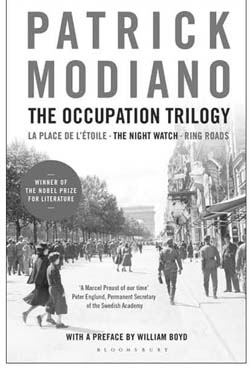As our journey into the future continues—the present moment drifting away, our own biographies lengthening, our pasts receding inexorably, quietly becoming “history” in the distance— so certain aspects of those retreating eras seem to come more sharply into focus and claim our attention. The longer view allows us to see these features of the recent past as truly defining characteristics of those decades that we lived through.’—William Boyd.
The translator, Boyd, beautifully sums up the trilogy as one begins reading the introduction. By the end of the book, revisiting this quote makes a lot of sense. In 1968, the first part of the trilogy was published and the author, Patrick Modiano was only twenty-two years old. Reading all the three novellas makes one realize the free form that was used while writing the works and there is a clear disjunction with the way a novel is written traditionally. What Boyd as a translator discovers is that the cultural mood of the sixties in general is ‘…to play fast and loose with chronology and ratiocination…’ L’Occupation or The Occupation Trilogy consists of three books—La Place De L’Etoile written when the author was twenty-two years old, The Night Watch written a year later and Ring Roads written when Modiano was twenty-six years old. The three short books look at France’s subjugation by Nazi Germany during 1941–1944.
La Place De L’Etoile introduces the character of Raphael Schlemilovich, Jew turned Nazi sympathizer and Modiano uses this character to use all the controversial issues of the twentieth century French literature. Using the first person narrative technique, Modiano tells the story of a man who starts pimping innocent women. The story builds up with the narrator stating—‘I am not a son of France. I never knew a life of grandmothers who made jam, of family portraits, and catechism. And yet I constantly dream of provincial childhoods.’ The transition of Schlemilovich to a betrayer is slow and steady. The reader is allowed into the mind of the narrator but the narrator is in charge of the story he tells and what he wants to reveal. He writes a confession for a Left Wing Paris newspaper under the pseudonym Jason X where he relates how he was asked to leave the army as he was Jewish. His confessions continue with him revisiting his childhood and how as a child it was because of his history school teacher that he came to know that he was Jewish. The confession creates a furore. The story line unravels slowly and the narrator is not in a rush. The world of French literature is explored and a look at the memoirs is emphasized. It is the memoirs that contain a person’s life and the wish to be preserved. There are voices of dissent who advise the narrator to give up the past and to join the Gestapo.
‘People quickly forget their origins, you know! A little flexibility and you can change your skin at will! Change your colour! Long live the chameleon!’ The betrayal that has been portrayed has to be understood as to how it came to be rather than be taken at face value. And although the transition is a slow one it makes the reader realize the inner dilemmas and the need to make people hear you. The narrator depressed and in despair now plays the Jew card to bring to attention all the years. ‘I’ll play the persecuted martyr to perfection…’ It is not that the narrator does not have a conscience and that comes through now and then with every sentence that he makes in favour of his betrayal to himself and to people in general. Modiano speaks through the novella: ‘Not content with debauching the women of this country, I want to prostitute French literature in its entirety.’ It is towards the end of the novella that the reader is informed that this is the narrator’s biography using the third person narrative technique. Raphael Schlemilovich kidnaps young women who are sold to brothels in Brazil. As the narrator reflects, ‘There were many of us who slept with Germany and the memory of it is sweet.’
Continue reading this review

